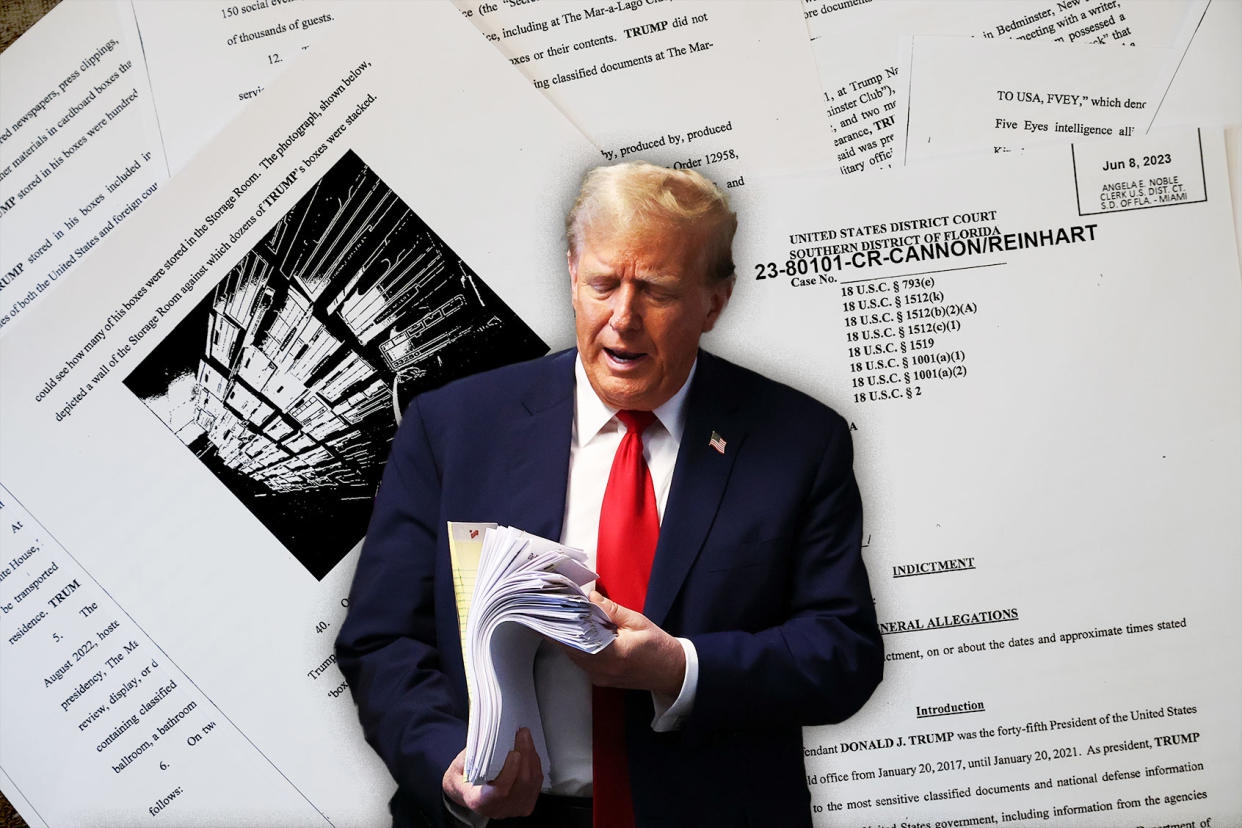"The peanut gallery": Experts say Cannon opened door to "unheard of" GOP intervention in Trump case

- Oops!Something went wrong.Please try again later.
- Oops!Something went wrong.Please try again later.
There should be no consequences for Donald Trump lying about federal law enforcement officers and falsely claiming he “nearly escaped death” because they were authorized to kill him, two dozen Republican attorneys general argue in a brief filed Sunday in the former president’s classified documents case.
In May, the presumptive Republican nominee for president, just before he was convicted on 34 felony counts in his hush-money trial, told his followers on Truth Social that he had been targeted for assassination by “Crooked Joe Biden’s” Department of Justice when FBI agents raided his Mar-a-Lago home to search for national security secrets he took from the White House. In order to do so, Trump and far-right allies like Rep. Marjorie Taylor Greene, R-Ga., distorted the exact same “standard procedure” the FBI always follows, including when Trump was president, under which agents are authorized to use force if they encounter a deadly threat while carrying out a law enforcement operation.
Special counsel Jack Smith, who charged Trump with stealing state secrets, wants to bar the former president from lying about law enforcement again. In a filing last month, he asked U.S. District Judge Aileen Cannon, the Trump appointee overseeing the former president’s oft-delayed case, to impose a gag order that would prohibit “statements that pose a significant, imminent, and foreseeable danger to law enforcement agents participating in the investigation and prosecution of this case.”
Cannon has not yet definitively ruled on the matter, so far only chiding the prosecution for lacking “professional courtesy” by failing to discuss it first with Trump’s legal team. In the meantime, in the wake of MAGA incitement, one avowed Trump supporter has already been arrested in Texas for threatening to kill federal law enforcement officers — specifically, texting an FBI agent and threatening to “slaughter you like the traitorous dogs you are,” per a June 13 press release from the Department of Justice.
So what? That’s the response from the 24 Republican AGs, including Texas’ Ken Paxton. In a June 16 filing, they ask Cannon to grant them permission to intervene in Trump’s case, claiming the former president’s freedom to slander law enforcement is sacrosanct.
A gag order barring Trump from making false claims about the law enforcement agents involved, specifically, in his classified documents case “may affect the election, the First Amendment rights of tens of millions of Americans, and will prevent [former] President Trump from opining on this important national election matter,” the Republicans argue.
In that, the AGs are merely echoing the argument from Trump’s own legal team, which last week argued that Trump’s incitement is actually “campaign speech,” suggesting he’d like to talk about his scheduled June 27 debate with President Joe Biden, and that a gag order would constitute “totalitarian censorship of core political speech.” Ignoring the arrest in Texas, they also maintain that the government has failed to demonstrate that the specific agents Trump accused of trying to kill him are themselves at risk.
Although it is possible she sides with the government, legal experts who have observed her thus far say there is now an established pattern of the judge siding with the defense, perhaps best demonstrated by the fact that, a year after being randomly assigned the case, there are no indications that she will schedule a trial before November.
Bradley Moss, a criminal defense attorney who specializes in national security issues, told Salon that Cannon should not even be wasting the court's time by considering arguments from outside parties. She's already scheduled a hearing at which right-wing attorneys who aren't part of the case will be given time to argue that the Constitution prohibited the appointment of a special counsel in the case.
"The influx of amicus briefs in this case is unheard of and largely the result of Judge Cannon’s decision to allow everyone under the sun to chime in on a criminal matter," Moss said. "This should be a simple legal issue to resolve over modification to bail conditions. It does not require input from the peanut gallery."
The constant, self-imposed delays on Cannon's part have come despite the fact that the case is arguably the most straight forward of all those against Trump: He definitely took the documents in question — he’s on tape discussing top-secret Iran war plans and admitting that he has no right to share them — and definitely did not hand them all back.
Want a daily wrap-up of all the news and commentary Salon has to offer? Subscribe to our morning newsletter, Crash Course.
“The main thing that [has] stood out to me is how she has constantly caused delay in the case instead of moving it forward,” Shira Scheindlin, a former federal judge, told NPR over the weekend. The second: “[S]he seems to have a visceral dislike of Jack Smith and his team. She’s constantly criticizing them. She’s constantly being sharp and sarcastic with them, and she almost never treats the defense that way.”
She is inept, Scheindlin said, but also perhaps cynical.
“I think she is inexperienced and I think it makes her insecure in her rulings. She's tentative,” Scheindlin said. “But the motivation may be mixed in with intentionally delaying enough to make sure this doesn't go before the election.”
Cannon has scheduled a hearing on Smith’s gag order request for June 24, although it is unclear when she might actually issue a ruling. That hearing will come more than a month after the case was originally set to go to trial.

